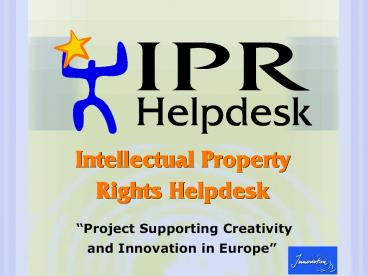IPR issues within FP6 PowerPoint PPT Presentation
1 / 15
Title: IPR issues within FP6
1
(No Transcript)
2
Intellectual Property Rights (IPR)
issues within the 6th Framework Programme Magali
POINOT Representative Officer Legal
Coordinator Magali.Poinot_at_ua.es
3
1 Generalities
- What is it about?
- IPR provisions govern the ownership, transfer,
dissemination and use of research results
generated during FP6 project - When does IP matter?
- Preparation of the proposal conduct patent
searches to identify prior art and possible
IPR-protected areas, - Negotiation possible specific IPR provisions to
be agreed (consortium agreement), practical IPR
management, - Implementation of the project protection of the
results, management of resulting IPR, granting of
access rights, , - After the project use/dissemination of the
results (possibly by granting licenses to third
parties),
4
2 Objectives within FP6
- To ensure a smooth implementation of the project
- Same rules for each instrument (/-), same rules
for each participant - Increased certainty of participants
intellectual property - Balanced access rights system
- To promote the use of the knowledge
- Necessary access rights are available
- To promote the dissemination of the knowledge
- while taking the Communitys, participants and
projects interests into account
5
3 Key words (definitions)
- Pre-existing know-how
- Background Sideground
- Knowledge
- Foreground
- Use
- Commercial exploitation Utilisation in further
research activities - Dissemination
- Access rights
- Licenses User rights
6
4 Ownership
- Pre-existing know-how
- Always remains the property of the participant
concerned - Knowledge
- Principle property of the participant who
generates it - Exceptions
- ? Joint property of several participant where
generated by several participants impossibility
to determine the exact contribution of the
participants concerned - ? Always the property of the SMEs for knowledge
generated within specific actions for SMEs
(Co-operative Collective RTD projects) - ? 100 EC-funded actions (direct actions, public
procurements)
7
4 Ownership
- Transfer of ownership of knowledge
- The participant concerned shall inform the
Commission and the other participants - The participant concerned shall conclude
agreement(s) to pass on its obligations (e.g.
access rights) - The Commission and other participants may object
in exceptional cases - ? case of transfer to entities established in
non-Member States - or non-Associated States
- ? affecting to the rights of the other
participants - ? affecting to the legitimate interest of the
Community
8
5 Protection of knowledge
- Requirement
- Principle participant owning knowledge
- Exception the Commission if the owner fails to
do so - Knowledge concerned
- Knowledge that is capable of industrial and
commercial application having due regard to the
legitimate interest on the participants
concerned (flexible requirement) - How?
- By an adequate and effective protection
- In conformity with relevant provisions of the
contract (and of the consortium agreement, the
case being)
9
6 Use of knowledge
- Requirement
- By who?
- Participants owning (or having access rights to)
knowledge - Possibly third parties having access rights
- How?
- By commercial exploitation or utilization in
further research activities - If needed, by using pre-existing know-how as
well - In accordance with the interest of the
participants concerned (flexible requirement) - Terms to be set out by the participants in a
detailed and verifiable manner
10
7 Dissemination/Publication of knowledge
- Knowledge concerned
- Any data or information concerning the knowledge
- Requirement for dissemination
- By who?
- Publication the participant owning the
knowledge (in Cooperative Collective research
all participants) - Dissemination all participants
- The Commission where the participant fails to do
so - How?
- Publications required prior approval of the
Commission and the other participants, which may
object - Provided that dissemination/publication does not
adversely affect the protection or use of the
knowledge
11
8 Access rights
- General principles
- Granted on written request
- No sub-licensing (even for affiliate companies)
- ? unless explicitly agreed (e.g. in the
consortium agreement) - ? possible optional clause for software, allowing
sub-licensing, ... - Obligatory access rights between participants
are limited to what they really need - ? either for carrying out the project or for
using their own knowledge ... - ? but broader access rights may be freely
negotiated - Possible granting of access rights to third
parties - The Commission may object in exceptional cases
(cf. transfer of ownership)
12
8 Access rights
- New features
- Obligatory access rights are limited to
participants of a same project - Clear/simplified financial conditions
- ? royalty-free basis
- ? fair and non-discriminatory conditions to be
agreed - Possibility to exclude a specific piece of
pre-existing know-how from the obligation to
grant access rights - ? obligatory agreement of all participants
concerned - ? to be agreed before signature of the EC
contract before a new participant joins the
project - ? should not concern core pre-existing know-how
13
8 Access rights
14
9 For more information
http//www.ipr-helpdesk.org
REPRESENTATIVE OFFICE Avenue Louise, 106 B-1050
Brussels T. 32 2 649 53 33 F. 32 2 647 59 34
- HELPLINE
- T. 34 96 590 97 18
- F. 34 96 590 97 15
- E-mail ipr-helpdesk_at_ua.es
15
9 For more information
- Official sources
- General information on FP6
- http//europa.eu.int/comm/research/fp6/index_en.ht
ml - Participation and dissemination rules
- http//europa.eu.int/comm/research/fp6/documents_e
n.htmlrules - Model contract
- http//europe.eu.int/comm/research/fp6/working-gro
ups/model-contract/index_en.html
THANK YOU FOR YOUR ATTENTION QUESTIONS AND
ANSWERS

